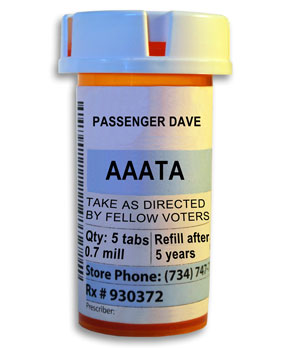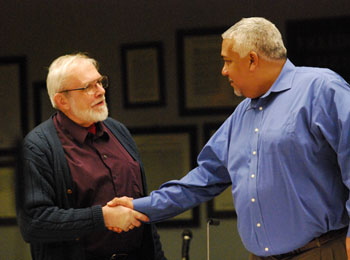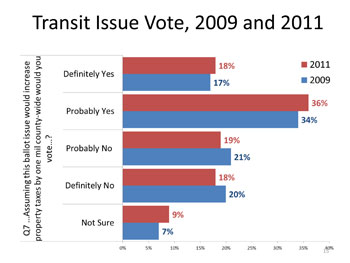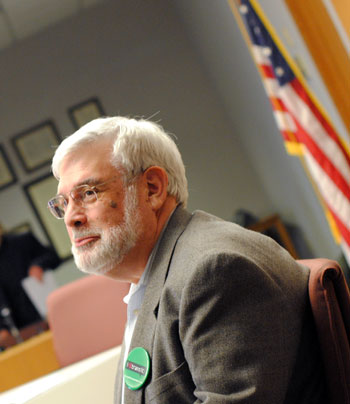Ann Arbor Area Transportation Authority special board meeting (July 23, 2013): No regular board meeting was scheduled for July, but the AAATA board called a special meeting toward the end of the month, to handle some unfinished business. That included: (1) authorization of a contract extension with Select Ride to provide required paratransit service under the Americans with Disabilities Act (ADA); and (2) authorization of a contract to move a fire hydrant at the AAATA’s headquarters at 2700 S. Industrial Highway.
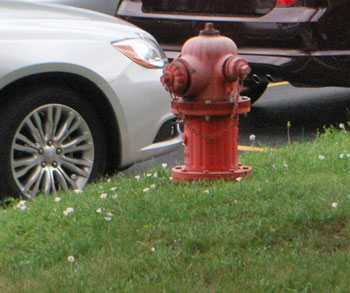
Fire hydrant at the Ann Arbor Area Transportation Authority headquarters at 2700 S. Industrial Highway, which needs to be moved as a result of a garage expansion project. (Photos by the writer.)
The possibility of the special meeting was indicated at the AAATA’s June 20, 2013 board meeting, when CEO Michael Ford mentioned that a special session might be called to handle some routine matters – as well as issues related to the addition of the city of Ypsilanti as a member of the AAATA.
Those related issues could have included a vote to place a question on the November 2013 ballot, asking voters in the cities of Ypsilanti and Ann Arbor to approve a transit millage to be levied by the AAATA. However, at the July 23 special meeting, Ford pointed toward a May election as more likely: “Obviously we’re going to be looking for a millage at some point in the near future. November was one opportunity, but I don’t think that’s probably going to happen,” Ford told the board. “I think we’re probably looking at May, to be realistic. We’re gearing up for some potential there.”
The two cities currently levy millages that are dedicated to transit, which are then passed through to the AAATA. The ability for the renamed AAATA to levy such a millage with voter approval was a power also enjoyed by the AATA, but was never exercised. The request for additional funding – through a levy by the AAATA – is based on an AAATA plan to increase and expand service in the two cities and through establishing longer-term purchase-of-service agreements with some adjoining townships.
The authorization of a $109,000 contract with Blaze Contracting to relocate the fire hydrant was the second time the board has authorized such a contract. Last year, the board approved a deal with RBV Contracting for the work. However, the contract was not awarded, because the necessary agreements with the University of Michigan, which owns adjoining land involved in the hydrant relocation, were not in place.
The board’s action to approve the Select Ride contract – which is valued at $3,016,871 for the coming year – came under time pressure to ensure that the AAATA could continue its paratransit service. The provision of complementary paratransit service for people with disabilities – as an alternative to the fixed-route service – is a requirement of the Federal Transit Administration under the Americans with Disabilities Act. Under the negotiated terms, the third year of Select Ride’s contract includes a one-time “stabilization payment” to Select Ride of $100,000 to be paid by July 31, 2013. The contract also includes a 5% ($150,000) increase for this final year of the contract. The staff memo in the board’s information packet attributed the increases to the rising consumer price index (CPI) and to fuel costs.
The state’s local bus operating (LBO) assistance – money from Act 51 that’s allocated to transportation agencies statewide using a complex formula – was a topic that arose during the July 23 special meeting in two ways. As a result of state legislative action, the AAATA now expects $800,000 of previous decreased funding from the state’s LBO to be restored. When the Michigan Dept. of Transportation applied the distribution formula last year, it resulted in about $800,000 less funding to the AAATA – and that had an impact on the AAATA’s FY 2013 budget. The agency is currently operating on slightly less than the 3-month cash reserve required under board policy. At the July 23 meeting, it was reported that a bank transfer of $500,000 had taken place, with the remaining amount expected later.
The LBO is also a source of funding that the southeast Michigan regional transit authority (RTA) would like to use to cover administrative expenses. The RTA was created in late 2012 through a lame-duck legislative action. The RTA is supposed to coordinate transit in a four-county region (Washtenaw, Wayne, Macomb and Oakland) that includes the city of Detroit. AAATA board members expressed some disappointment during their July 23 meeting that Gov. Rick Snyder and the state legislature had created the RTA without providing for adequate initial funding. The RTA could eventual obtain voter-approved funding through a millage or a vehicle registration fee.
AAATA board members objected to the fact that LBO money was being used for the administrative overhead of the newly created RTA, instead of being used to provide transportation “on the street” by the transit agencies in the four-county region. Those include DDOT (Detroit Dept. of Transportation) and the Suburban Mobility Authority for Regional Transportation (SMART). The negative impact on the AAATA for the next year of funding for the RTA – using the state’s LBO assistance – is estimated at about $68,000. [Full Story]




